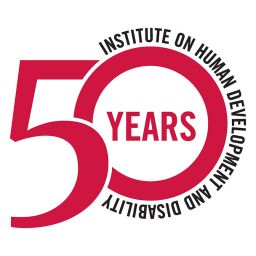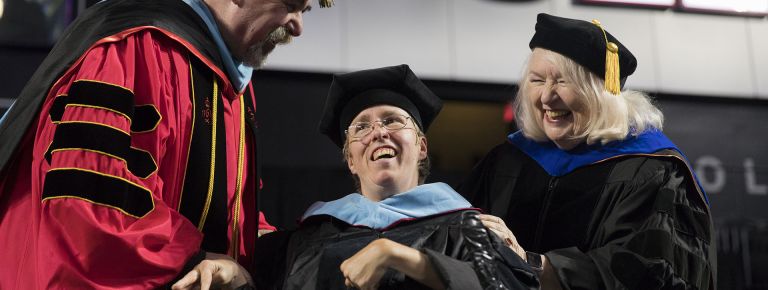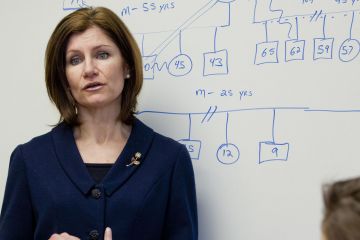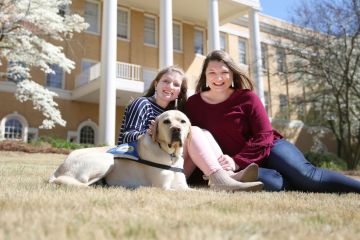A community where everyone belongs
It’s the early 1960s.
Vietnam is heating up, riots and protests are rampant.
Against this turbulent backdrop, the Kennedy administration passes the Community Mental Health Act of 1963.
Part of Kennedy’s New Frontier program, the act is designed to provide federal funding for construction of community mental health centers and research facilities as an alternative to institutionalization.
At the time, children with disabilities are routinely denied access to a public school education and few university students learned about people with disabilities in their coursework.
Born out of Kennedy’s own experience – his older sister Rosemary has an intellectual disability – the landmark legislation represents a significant shift in federal policy toward the issue of mental health and disabilities.
Mary Speirs, dean of the School of Home Economics, later to become the College of Family and Consumer Sciences, is one of five UGA deans to apply for federal funding in 1965.
Four years later, the Athens Unit of the Georgia Retardation Center opens at a new facility now known as River’s Crossing on College Station Road.
“The unit was designed to provide clinical experiences for students at the University of Georgia preparing for careers in the field of mental retardation,” according to early documents produced by the Georgia Department of Public Health and UGA.
By 1971, the center had an enrollment of 21 day and 34 residential students and had provided training and observational opportunities for more than 500 UGA students.
Zolinda Stoneman arrived as a faculty member at UGA in 1976 and was named director of what is now the Institute on Human Development and Disability in 1989.
She has spent her entire career as a teacher, researcher and advocate for people with disabilities and their families.
“Sometimes I’m frustrated there hasn’t been more change,” Stoneman said. “Our anniversary has provided me with the opportunity to look back and realize the remarkable progress we have made in the 50 years since the unit was founded.”
From new studies and outreach programs to landmark court cases and legislation, the preceding half century has dramatically altered the lives of people with disabilities.
“We moved from segregated programs that kept people separate and isolated to efforts that support everyone to be fully included in our schools, neighborhoods, businesses and workplaces,” Stoneman said. “These changes are reflected in IHDD’s anniversary slogan, ‘A Community Where Everyone Belongs.’ ”
At UGA, that progress is evident in the work carried out by Stoneman and her colleagues at IHDD, and by the accomplishments of people like Justin Mejias.
Diagnosed with autism as a child, Mejias recently completed the Destination Dawgs program, an initiative launched by IHDD in spring 2017 as a college and career readiness program for students with intellectual disabilities.
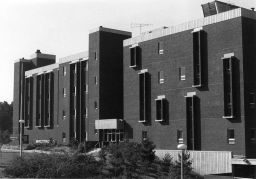
He now works as an inclusion aide for Athens-Clarke County Leisure Services, and was chosen to speak at FACS Convocation in May 2019.
“I learned that anyone can achieve their dreams if they are willing to work hard and find the support they need to overcome the obstacles in their path,” Mejias said.
It’s the kind of outcome that continues to energize Stoneman in her career-long pursuit of justice and acceptance.
“There’s no reason we can’t have people with disabilities as our co-workers, as people sitting next to us in the church pew or as the minister or teacher,” Stoneman said. “Like everyone else, people with disabilities want meaningful lives, a nice place to live, rewarding work, friends, loving relationships, a chance to learn and experience new things, a feeling of belonging and an opportunity to contribute to their communities. And I know that by continuing to work for these things, it’s possible to really make a difference for people.”
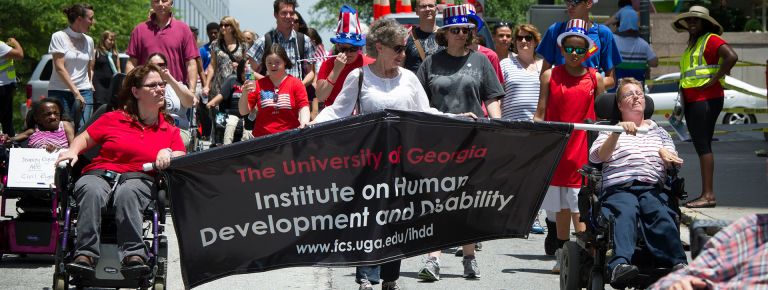
Zo Stoneman, directory of IHDD, at a disability rights parade in Atlanta. Photo by Robin Nelson
Timeline
1969
The River’s Crossing building, built with federal funds, opens its doors in September. The Athens Unit of the Georgia Retardation Center, later to become the Institute on Human Development and Disability, provides:
- Classroom education for children with disabilities from 28 northeast Georgia counties. Three classrooms are administered by FACS and five by the UGA College of Education.
- Overnight accommodations for children who live too far away to commute daily to school.
- Internship and practicum opportunities for UGA students from 14 disciplines representing five UGA schools and colleges.
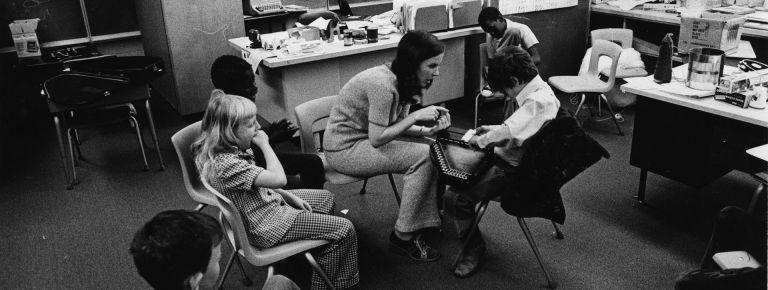
1973
Section 504 of the Rehabilitation Act becomes law, mandating federal agencies and agencies receiving any federal funds to not discriminate on the basis of disability.
1975
The Education for Handicapped Children Act (renamed the Individuals with Disabilities Education Act, IDEA, in 1990) guarantees a free, appropriate public education for all children with disabilities. IHDD served preschoolers from its inception. In 1975, a mobile unit provides diagnostic and educational services for young children living in rural areas.
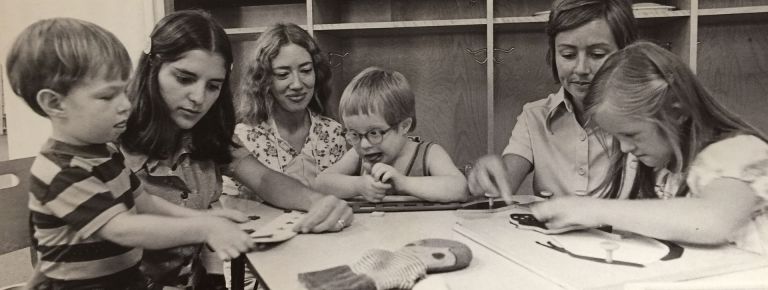
1976
Georgia’s first in-home intervention program for families of infants with disabilities is established.
1977
IHDD conducts a needs assessment in six Georgia counties focused on aging people with disabilities. It is the first effort in Georgia to understand the service needs of an aging population. In the 1980s and 1990s, IHDD uses the arts to include seniors with lifelong disabilities in senior centers and builds collaboration between Georgia’s aging and disability service networks.
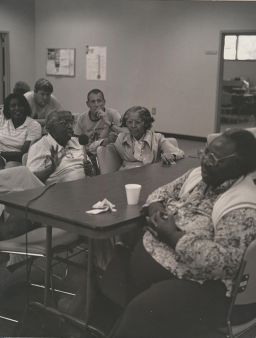
1978
Parent Helpers is established as the first Georgia program offering peer support to families of newly diagnosed children with disabilities. The program merges with Parent to Parent of Georgia in 1982. IHDD disseminates the model nationally in 1984 and internationally through the Air Force in 1986. Also, IHDD hosts the regional activities of Marc Gold, whose innovative training strategies demonstrate that individuals with the most significant disabilities can be employed.
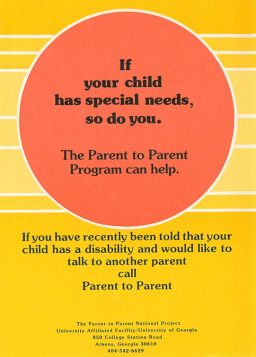
1983
IHDD begins to include children with disabilities at the Child Development Lab at the McPhaul Center, culminating in 1985 with the establishment of one of the state’s first inclusive preschool programs.
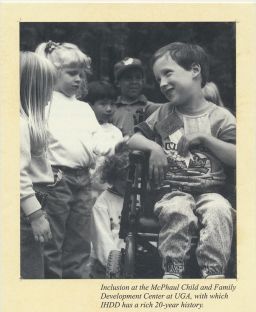
1989
IHDD moves administratively from the College of Education to FACS.
1990
The Americans with Disabilities Act becomes law, a far-reaching law providing civil rights protections to people with disabilities.
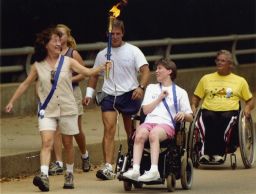
1994
The IHDD Consumer Advisory Council holds its first meeting. Also, the Georgia Personal Assistance Corps, one of the first AmeriCorps projects, is funded as one of three corps actively recruiting people with disabilities to provide service to their communities. In 2001, Everyone Can Serve disseminates the inclusive service model nationally.
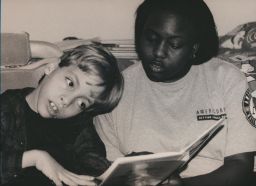
1996
River’s Crossing becomes the first Georgia institution for individuals with disabilities to close; students who moved to the community are followed for 10 years by IHDD researchers, with very positive outcomes documented.
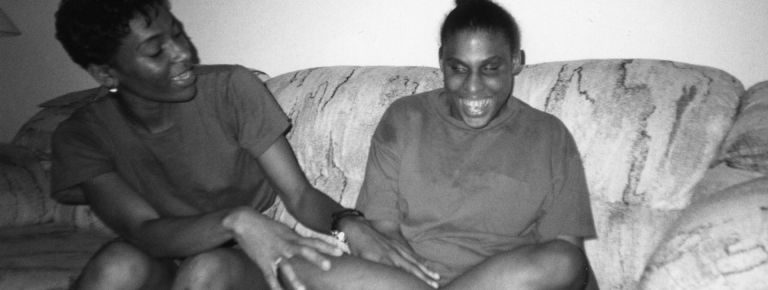
1998
IHDD officially becomes an institute.
1999
The U.S. Supreme Court rules in the landmark Olmstead case that under the Americans with Disabilities Act, isolating people with disabilities in segregated residential institutions constitutes discrimination based on disability. The case, which originates in Georgia, is a major victory for disabilities rights advocates. IHDD becomes the primary supporter of People First of Georgia, a self- advocacy network, and takes responsibility for assisting self-advocates in coordinating the next 11 annual statewide People First conferences.
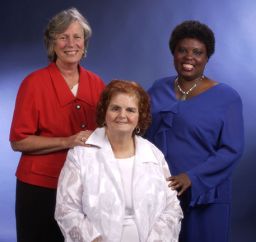
2003
IHDD supports Lois Curtis and Elaine Wilson, the plaintiffs in the Olmstead case, to develop small businesses: Lois as a folk artist and Elaine as a public speaker.
2004
The First IHDD classes are offered at UGA.
2005
The Children’s Freedom Initiative is formed. CFI is a collaborative effort to ensure that children who live in facilities are given the chance to live with permanent, loving families. Also, FarmAgain’s AgrAbility project is funded. It is designed to assist farmers and other agricultural workers with disabilities and chronic health conditions with assistive technology solutions.

2006
Graduate and undergraduate Disability Studies Certificate programs are approved. The first three students graduate with Disability Studies Certificates in 2008.
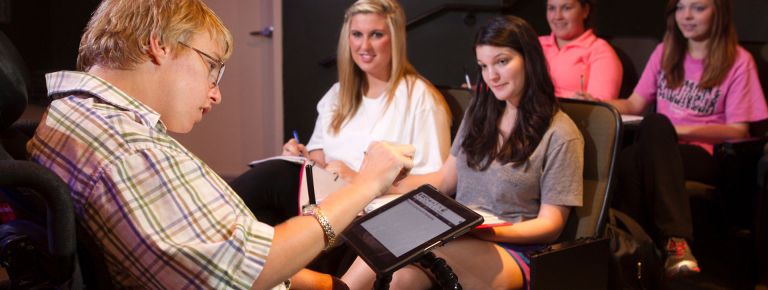
2013
IHDD, the UGA Richard B. Russell Special Collections Libraries and the Shepherd Center in Atlanta found the Georgia Disability History Alliance to preserve the state’s disability history. GDHA sponsors an annual Disability History Symposium.
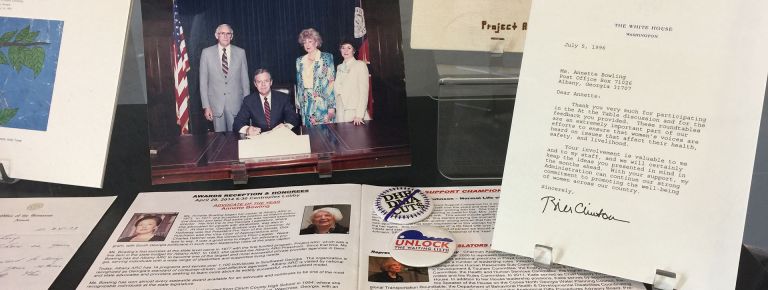
2017
The Destination Dawgs program for students with intellectual and developmental disabilities is launched. The first cohort of five students receive a Certificate in College and Career Readiness and the group is recognized at both FACS Convocation and UGA Commencement in May 2019. More than 80 UGA students serve as peer mentors during spring semester 2019.
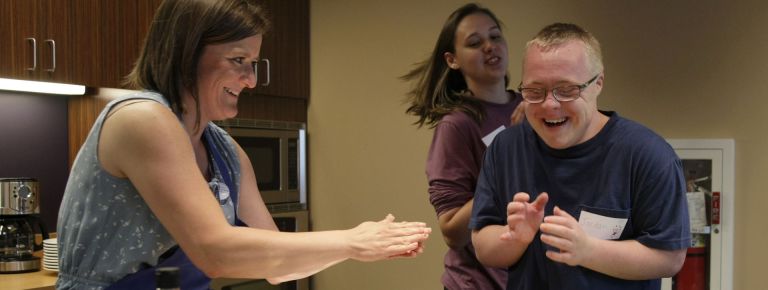
2019
IHDD turns 50
